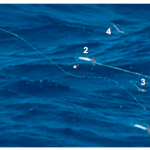A new article in Journal of Geophysical Research by Gouretski and Koltermann shows global warming estimates since the 1950’s are positively biased 0.2 – 0.4 °C due to discrepencies between temperature readings from the expendable bathythermograph (XBT) device and Conductivity-Temperature-Depth (CTD) sensors.
5 Replies to “Gear bias in global warming estimates”
Comments are closed.






It is hard to judge the paper because it is behind a pay wall. But the thing in the abstract that caught my eye was the last two sentences:
That is a very large error bar. In essence, they appear to be saying ‘we think the total change in the heat content of the global ocean since 1950 is only about 62% of what we thought it was. But our error bar for the actual number runs from at least 18% to 155% because the actual sample data is thin.’ That kind of error bar is like my saying ‘Los Angeles is between 72 and 620 miles away by freeway from San Jose, but it could be more or less than those numbers’.
Just wait until the global warming sceptic crew distorts the result into ‘global warming only 60% of what was thought’ in spite of the fact that is not what the paper says.
Hey! have u listened to yourself?
You are worried about a skeptic (like me) to use disinformation, rather than worry about the freaking possibility that the THEORY you back up having such a large error bar?
The THEORY of global warming is pretty much based entirely on large error bars. Please, read past the new age hippie B.S and look at the science. Global Warming is an age old theory in science, its not new, its not radical, its stupidity. Learn from the past people, the climate change because of humans theory has been around for well over a hundred years now and it keeps changing. NO ONE actually knows what they are campaigning for or researching and the oil industry is NOT out there to get you.
Get a grip,
BUZZ1E BEE
Buzz…
If you doubt global warming maybe its time to review the evidence…http://lwf.ncdc.noaa.gov/oa/climate/globalwarming.html. You also seem to be somewhat confused about what a theory is. In science a theory is a scientific hypothesis that continously survises testing. As far as the oil industry, they are out for profits as all business is. This often means they are indeed are not concerned about the public’s best interest and rarely concerned about the evironment.
Who cares if someone has a scientific theory and whether it has survived testing. That is totally irrelevant. The real question is and always should be: has this things (could be scienfific theory, could be employee, could be girlfriend, could be anything) been succesfully used in the past for the purpose for which I am using it. If it has been sucessfully used than that is a good reason to trust it to be used for that purpose in the future. If it hasn’t then why should you trust it?
Global warming and all these climate models are things. The purpose we are interested in is predicting future climate change and its effect (beneficial/terrible) on the rest of the world. Do the climate models have any sucess or history of successfully predicting climate or its effect on the world. Absolutely not. Here is a metaphor for climate models: think of climate models as job seekers. Climate models are like job seekers that have plenty of education but absolutely no work experience. Now would you hire such a person into a job with tonnes of responsibility and involving enormous amounts of money. No way. You might put them in entry level positions. But until they have proven themselves there is no reason to elevate them to a higher position.
People have made this mistake before. Communism is a good example of something that was supposed to be good in theory but had never been sucessfully tried.
“Do the climate models have any sucess or history of successfully predicting climate or its effect on the world. Absolutely not.” – Assman
I liked the way this comment was going, but then you made this statement, Assman. The history of climate models is short (decades) in comparison to the climate changes they anticipate (centuries to milennia).
In general, climate models are predicting rising mean temperatures and higher mean sea levels, and this is what is happening. Therefore, the models have demonstrated some success. This is evident in several countries around the world where scientists, industrialists, and policy makers are taking steps to ameliorate anthropogenic impacts to the atmosphere.
Open yourself to the possibility that global warming is real. Models identify strong trends, and often fail in the details. The strong trend here is warming temperatures coupled with sea level rise. (Have you noticed the Arctic is melting?) It is true that models can be deceiving, but error detection in a single parameter does not necessarily imply failure in the model. These are complex and dynamic systems. If you think about it, you must agree that climate models are useful for testing hypotheses, if not for prediction.